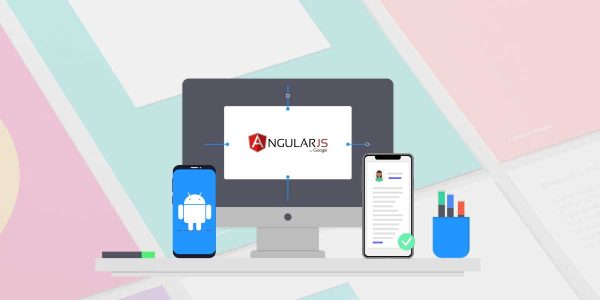
Mobile applications have become indispensable in our daily lives. With millions of smartphone users worldwide, businesses constantly seek ways to enhance user experience and engage customers effectively.
AngularJS, a popular JavaScript framework, has emerged as a robust choice for mobile app development due to its versatility and efficiency.
This post will look at the benefits of utilizing AngularJS for mobile app development and provide essential insights into creating powerful and responsive mobile applications.
Understanding AngularJS
AngularJS, developed and maintained by Google, is an open-source JavaScript framework designed to simplify web application development. It enables developers to build dynamic, single-page applications (SPAs) quickly. The framework uses the Model-View-Controller (MVC) architecture to separate the presentation, data, and logic layers, facilitating code organization and maintainability.

Why Choose AngularJS for Mobile App Development?
a. Enhanced User Experience: AngularJS offers a seamless and intuitive user experience by allowing the development of responsive and dynamic mobile applications. It enables developers to create interactive interfaces, smooth animations, and real-time updates, enhancing user engagement.
b. Cross-Platform Compatibility: With the rising demand for apps on multiple platforms, AngularJS provides a solution for cross-platform development. By leveraging frameworks like Ionic or NativeScript, developers can build seamless applications, dramatically decreasing development time and costs for Android and iOS devices.
c. Code Reusability: AngularJS promotes code reusability. The same codebase can be used for both online and mobile app development. By streamlining the development process, this feature enables quicker deployment and more straightforward maintenance.
d. Built-in Testing: AngularJS is robust, making it more straightforward for developers to evaluate their skills and write and execute unit tests. Ensures the mobile application is stable, reliable, and bug-free.
e. Rich UI Components: AngularJS offers a vast collection of pre-built UI components and third-party libraries, enabling developers to create visually appealing and feature-rich mobile apps.
Best Practices for AngularJS Mobile App Development
a. Mobile-First Approach: When developing mobile applications with AngularJS, adopt a mobile-first approach to ensure that the app is optimized for mobile devices from the outset. This approach focuses on designing the app for smaller screens and scaling it up for larger ones.
b. Optimize Performance: Mobile app performance is crucial for user satisfaction. Minimize HTTP requests, optimize images, and use lazy loading techniques to enhance the app’s loading speed and overall performance.
c. Responsive Design: Implement responsive design principles to create a user interface that adjusts seamlessly to different screen sizes and orientations.
d. Use Cordova or Capacitor: To deploy your AngularJS app on mobile devices, consider using Cordova or Capacitor. These frameworks provide access to native device features, such as camera, GPS, and accelerometer, enabling a more integrated user experience.
e. Offline Functionality: Design your app to offer basic functionality even when the user is offline. Caching data and leveraging the service worker API can ensure that the app remains accessible, regardless of the internet connection.
Steps to Develop an AngularJS Mobile App
a. Project Setup: Set up your AngularJS project(Node Package Manager), for example, as a package manager. Create the necessary project structure and install the required dependencies.
b. Design the User Interface: Use HTML, CSS, and AngularJS directives to design the user interface. Ensure that the layout is responsive and mobile-friendly.
c. Implement Controllers and Services: Define controllers and services to manage data and application logic. Controllers handle user interactions, while services manage data and communication with backend APIs.
d. Implement Routing: Set up routing to create a smooth navigation experience within your mobile app. Define routes and configure the app to load the appropriate views based on the URL.
e. Test and Debug: Conduct thorough testing and debugging throughout the development process to promptly identify and resolve any issues.
f. Optimize for Performance: Optimize the app’s performance by reducing load times, eliminating unnecessary components, and employing caching strategies.
g. Deployment: Once your mobile app is ready, deploy it on your preferred platform using Cordova or Capacitor.
Top AngularJS Mobile App Development Frameworks
a. Ionic: Ionic is a popular framework for building hybrid mobile apps using AngularJS, HTML, and CSS. It is a popular option for cross-platform app development because it provides many UI components and native functionalities through plugins.
Native functionalities through plugins, making it a preferred choice for cross-platform app development.
b. NativeScript: NativeScript enables developers to build native mobile apps using AngularJS, TypeScript, and CSS. It provides direct access to native APIs, allowing developers to create high-performance applications.
c. Onsen UI: Onsen UI is another excellent framework for hybrid mobile app development with AngularJS. It offers a comprehensive set of customizable UI components to create visually appealing apps.
d. Framework7:Although primarily focused on iOS and Material Design, Framework7 can be used with AngularJS to design mobile applications with a native feel and style.
Conclusion
AngularJS has revolutionized mobile app development, providing developers with a powerful and efficient framework to build responsive and feature-rich applications. With its extensive tools, libraries, and support for cross-platform development, AngularJS empowers businesses to engage their mobile audience effectively.
By adhering to best practices and choosing the proper framework, developers can create mobile applications that provide a seamless user experience and promote business success in the mobile environment.
RELATED ARTICLES:
Leave a Reply